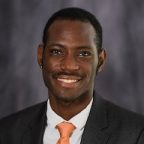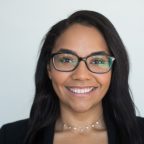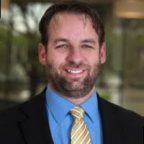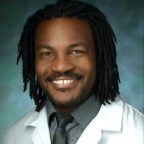In Part 2 of our second episode, we continue the conversation with UT Austin Dell Medical School students, Ciaura Brown, Deonna White, and Dekoiya Burton, moderated by Dr. Brandon Allport-Altillo, Clinical Educator and Assistant Professor of Medicine and Population Health at Dell Medical School, about their personal and professional experiences with race in medical education. We extend our gratitude to Brandon, Ciaura, Deonna, and Dekoiya for their bravery and willingness to share their stories.
Guests
- Ciaura BrownMedical Student at the University of Texas at Austin's Dell Medical School
 Dekoiya BurtonDual-Degree Student in the Dell Medical School and the McCombs School of Business at the University of Texas at Austin
Dekoiya BurtonDual-Degree Student in the Dell Medical School and the McCombs School of Business at the University of Texas at Austin Deonna Reese-WhiteDual-Degree Student at the Dell Medical School and the McCombs School of Business at the University of Texas at Austin
Deonna Reese-WhiteDual-Degree Student at the Dell Medical School and the McCombs School of Business at the University of Texas at Austin
Hosts
 Nick Smith-StanleyAssociate Director of Administration and Strategic Planning at the Livestrong Cancer Institutes
Nick Smith-StanleyAssociate Director of Administration and Strategic Planning at the Livestrong Cancer Institutes Brandon AltilloAssistant Professor in the Department of Internal Medicine at the University of Texas at Austin
Brandon AltilloAssistant Professor in the Department of Internal Medicine at the University of Texas at Austin
[0:00:00 Speaker 0] We’re a resource for learners, including every member of the live strong cancer institutes on track educational pipeline, from middle school to residency. We’re growing collection of interviews, talks and experiences the uncover the myths and the uncertainties of cancer and careers and cancer in order to empower and inspire generations of thinkers and leaders. This is cancer uncovered, uneducated, in and empowerment podcast by the live strong cancer institutes
[0:00:37 Speaker 3] the way that we, as health care providers, can actually begin to deliver culturally competent care unless we start to see people how they
[0:00:52 Speaker 2] see themselves. But
[0:00:53 Speaker 1] I think by having these conversations and existing and calling it out, we’re doing a lot of work now. There’s so much work to be done.
[0:01:02 Speaker 4] Hopefully my future rewards the intersectionality that I bring to the table.
[0:01:07 Speaker 2] What if we realized the best way to ensure an effective educational system is not by standardizing our curricula and tests, but by standardizing the opportunities available toe all students Abram X candy in how to be an anti racist Black Americans and people of color have been victims of systemic racism and academics, medical education and health care for generations. In part one of episode two UT Austin DEL. Medical Students, C. R. A. Brown Decoy Burton and Deana Reese White joined assistant Professor Brandon Al Port Lto to share their experiences with racism. To continue the conversation with Part two, we re join the group who share their views on what is needed to create um, or anti racist society as well as their hopes for the future. We recognize these air difficult conversations, conversations that might make us uncomfortable but uncomfortable is good If these conversations make you uncomfortable, I invite you to sit with those feelings for a while, whether it’s mental or emotional discomfort or physical reaction that could be felt through stiffness of shoulders or unease in your gut. Explore these feelings and ask yourself where they might be coming from. Discomfort often provides an opportunity to learn and grow and can lead to true transformation
[0:02:27 Speaker 4] when the black lives matter. Hashtag and George Floyd Story got very popular on social media Ah, lot of white people were reaching out to me to apologize. Um, Toe asked me how I was doing, um, to see where my head was. Toe apologize for what I may be going through right now, and I just immediately was uninterested in the conversation. So I didn’t originally have any conversations with white people regarding this regarding race. One of the first conversations that I did have, after seeing lots of people take the social media and calling out their own white privilege and saying that they’re going to now read books and they’re about to donate and they are taking lots of photos. Um, just very skeptical like these. It just seemed like a bunch of grand promises that I didn’t even know what happen or not.
[0:03:25 Speaker 5] The only way to make changes is toe have those conversations with the people around us. It’s just sort of try to change society on that level. So I wanted to hear from you guys about positive conversations, especially recently, that you’ve had with white people and about race. How have those conversations gone? What made those conversations positive and and how do you think you can use that in the future?
[0:03:45 Speaker 4] We have these small groups that we do in our first year of medical school, where we learned pathology in a small group setting, and I was in a group where E never got told directly I was being aggressive or something like that. But I very much was criticized with, you know, my tone was off like I was being very sassy. We all just need to check our attitude. It was never anything directly to me, but it was lots of language that was directed at me when I was just simply talking or expressing myself or I mean, I didn’t think I was doing anything flagrant, but it went on for several weeks in that small group, actually brought me a lot of distress and basically someone would throw that out there, and then the entire group would not address it. And so then when it was my turn to speak, I would address that critique and try to press the issue of like, What do you mean, tone? What do you mean? I think that this is directed at me and everyone would just kind of looked at each other, and no one would just say it. What bothers me the most was that after we would leave those groups, there would be a couple of people in the group that would come to me and be like, You don’t know what that was about? Like you’re You’re definitely fine. You’re completely fine. Like, don’t worry about it. And I was just frustrated because I was sitting there, like, Why didn’t you say something? We were in a big group. Like why? Why are you telling me privately? Call it out. Call these things out. So a year later, I get a text from someone who was in that group with me who had got inspired with everything going on and started learning Maurin educating herself, and came across, um of some text about the stereotype of the angry black woman and how our society just pins that on lots of black women is not true and how that manifests and what micro aggressions are. And she realized how complicit she had been in that attack of someone she considered a friend. And when she text me and and wanted to chat about that, it wasn’t This apology for rape is, um, this big grand thing. It was an apology for something I specifically allowed happened to you and for me. I felt like the reason why that was so positive. I feel like everyone’s intention was to take their own accountability and say that they’re gonna try to combat systemic racism. But she took it a step further and identifying things that she might have done personally and not being afraid to say I was wrong in that moment. And I’m guilty of this too. And I’m going to let the person know that was harmed in that situation, even if they’re over it, that I recognized what I did wrong. Andi, I will work to not do that again. And I think that her level of honestly and accountability is what really make their conversation go well and, like, really kind of give me more optimism toe. Have more conversations with other people. After that,
[0:06:51 Speaker 1] I’m an M D MBA students. So the business school hosted a virtual meeting about what was going on and they sent out pre readings and videos and we broke did breakout rooms and I helped facilitate one of those breakout rooms and the conversation was great and it gave me a lot of hope, but a big pieces that everybody did a little bit of work ahead of time. They read something or they watched a YouTube video on systemic racism and that helped a lot in this conversation that we had, but everybody also just came with an open mind and they felt I lead with. This is a place where it’s a booth place and you’re not always going to say the right thing, But we’re here toe learn, and I think that helped a little bit. But everybody came with an open mind and some work already done. Andi, that’s what What I think ultimately made it positive. I
[0:07:56 Speaker 3] think one conversation that I had, I’m trying to think I’ve had a few waas again. I think that that same a bit, that the honest men because I’m also an M D MBA student and one of the things that I spoke to an attending a few days before that have been. I was on cardiology and this’ll attending said, We need to not just see people how we see them like one of the things that that had been. Someone said to me I see when I see you decoy I see you as a man, but the attendings that we need to learn to see people, how they see themselves and I was like when you may see me as a man, but I see myself as a black man. And so my perception of self interacting with the world is very different from how you proceed me to be interacting with the world. And I think it goes back to what you are saying there. If you’re not aware of how people perceive themselves or how stereotypes in the world are placed on them, it gets very complicated. And so when that attending said that to me, I thought that was so powerful because he had done the work. He had done the work and read a bunch of books and was like, There is no way that we as health care providers, can actually begin to deliver culturally competent care unless we start to see people how they see themselves. And unless we understand that, you know, if you’re poor, if you’re black, if you’re brown, these systems were not built with you in mind. And so what we do when interacting with those patients is gonna look very different for someone with a lot of resource, is who oftentimes is white and upper middle class and things like that or middle class, um, I’m not saying everyone is like that, but obviously people come from all different spaces, but it just looks different in how you’re interacting. What resource is you can give them. And and I thought that that was super powerful for me.
[0:09:58 Speaker 5] Yeah, so if I can summarize some of the characteristics that made these good conversations, so people doing work ahead of time so they’re not relying on you to provide all of the background information, which is an additional burden, right? Everyone, being open minded is obviously very important honesty, personal accountability and then that sort of person to personal level interaction. Where you’re really talking about personal are specific events that happened. So one conversation that I had recently I was asked by a colleague how often I think about these issues with, you know, racism and systemic racism. Fine. And I had a hard time answering my question because I don’t know how to quantify the thoughts. And so my response was, Well, you know, I may not think about it consciously every day, but subconsciously, in my interactions outdoors, I’m always making sure that I am not appearing aggressive. And that’s like a constant subtext to my existence, right? Anytime I’m outside of my house. And so how often do I think about it? I don’t know. Is it a thought or is it? Ah, it’s just sort of a way of being. And what made that conversation I think powerful was that there was real learning that happened, because I don’t think that that person had sort of thought about that idea before that. It was not discreet thoughts, but it’s It really is sort of your existence in the world, and it’s a different way of being so that learning, I think, is what made that a positive experience for me. So I guess our last question here is sort of an aspirational question. But what are your hopes for the future of race in America and and how do you think that you can work in your career to make that future happen?
[0:11:40 Speaker 3] That’s heavy what it looks like. I think that your health, your wealth, your whatever outcome you measure will not be impacted by your zip code because we know we live in a very segregated society where that be through education, through housing, you name it in every which way we’re a segregated society. So until we can get to a place where it doesn’t matter what zip code you come from, doesn’t matter what your parents made. It doesn’t matter what they were. You can literally, anything. And I don’t even know what that looks like because it just I’ve never seen it until we can get there. Or every child you know, get a great education can go to cause if that’s what they wanna do, can become a position. If that’s what they want to do, That is where we go and what am I doing about it? Well, man, that’s a lot. I’ve been doing a lot. I won’t name all the stuff that I’ve been doing, but I’ll just say this. I’m existing in the world, is a black man, and that in itself is doing a lot. And I’m speaking up when and having conversations about the world that I would like to see. So it’s a it’s a star. It’s definitely not enough, but we could always be doing more.
[0:12:56 Speaker 1] I think about this question a lot, you know, as my wife and I start the process for building our family. My hope for the future is that our Children can exist in this world safely and be allowed to be Children. And then what am I doing? Career wise? Uh, this summer I’m getting to internship with a global pharmaceutical firm in their health, equity and population science department, working to advance inclusive research and diversify clinical trials to better represent patient populations. And, as a next year, start residency, uh, in neurology. I hope to continue this, like health equity work, um, to make sure all patients are getting excellent care and specifically in neurology. There are a lot of racial disparities that exist, Um, and a lot of research that isn’t done into those into those disparities that exist. So my future looks like a mash up of of that neuro healthcare equity disparities. There’s a lot of work to be done, and like, Duque said, I think by having these conversations and existing and calling it out, we’re doing a lot of work now. But there’s so much work to be done
[0:14:19 Speaker 3] for me. It’s put your money where your mouth is. You know, it’s it’s a lot of, you know, you look at probably diversity equity Inclusion Office they probably have some of the smallest budgets. And there’s there the afterthought, right? And so because this work is not, it’s a lot of investment work. It’s not a lot of you don’t you can’t make a profit off. This works a lot of building and building, and I mean, there’s many things that you know I love to see. I think one of the examples, like some students wanted toe, have like black lives matter pins or and they wanted to have like L G B T Q plus pin just to put on their white coat just to show solidarity. And I don’t think way didn’t have enough to do that. So I think it’s a lot of a lot about where, in your priorities of things is addressing systemic racism, Making sure you’re black students feel black students and faculty feel supported and what what money, What, you know, what funds are you going to get to those causes and are you going to continue to shrink those funds year over year or you going to you know, make sure that hey, we cannot leave these efforts out of our you know, our budget because I think what it looks like a different institutions is different, but it’s clear that we all need money to do it right. So and I think even Brandon said that, like, you know, he’s not getting paid for this work. You should absolutely getting paid for this right now, like this is a part of his day, you know? And so I think that, you know, just thinking, rethinking about how we fund this work and think about what value this work brings to our institutions is really, really necessary.
[0:16:05 Speaker 4] Yeah, I think regarding the future of race in America, I would probably echo the Korean Deana all day with health care wise. Just equity there, I would say systemic racism being a thing that we no longer live in existence. Honest conversations, accountability like real change that’s systemic, that’s prevalent. That’s palpable like that. We can actually say that that was a marker in time that actually changed everything and more optimism for black people in America who don’t have toe go about existing in spaces and knowing that the color of their skin is already setting them behind on the starting line, even though they’ve done the same amount of are a lot of times more work than other people. Ast faras my future Working towards that, I think that like the quaint mentioned just existing as a black person, hopefully my future rewards the intersectionality that I bring to the table. So my career, I hope to just be able to continue the work that I do with like stressing in the pipeline. Bringing resource is to people that are resource is depleted funding just existing. I think that ascertaining a lot of education and becoming a doctor is very highly regarded amongst a lot of different spaces. But for me, I consider myself black girl magic. And I don’t think that you have to have education for that. I think just being a black girl is black girl magic, all in of itself. Um and everything else is just bonus. So hopefully my field that just looks like inspiring other people and impacting other people and also getting from the world all the positive things that I deserved.
[0:18:07 Speaker 2] We want to thank Siara, Decoy Deana and Dr Out Port lto for contributing to this conversation. We’re grateful for their bravery and appreciate the opportunity to learn through their experiences. Conversation is on Lee the beginning, though we each must take deliberate actions each day to fight systemic racism toe. Learn more about systemic racism. We recommend reading How to Be an anti racist by Abram X. Kennedy and White Fragility by Dr Robin DeAngelo. I’m Nick Smith Stanley from the live strong cancer institutes, and this has been cancer uncovered. For more information on the live strong cancer institutes, check out del med dot utexas dot e d u. You can follow our director and chair on Twitter at S Gail Eckhart Eckhart is spelled e c k h a r D t. If you have questions or have ideas of topics that we can uncover, email us at LiveStrong cancer institutes at del med dot utexas dot e d u. Please make sure that institutes is plural, and if you like the podcast, make sure you subscribe. This has been cancer uncovered. Thank you for listening.